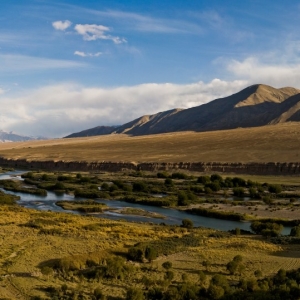Federal Water Tap, March 4: EPA Misses Lead and Copper Rule Deadline
The Rundown
Another delay in updating federal rules for lead and copper in drinking water. The Senate confirms Andrew Wheeler as EPA administrator. House Democrats propose to increase corporate taxes to raise up to $35 billion for water infrastructure. A big public lands package clears both chambers of Congress. Transportation regulators finalize rules requiring oil spill response plans for moving oil by train. A CDC investigation traces a 2017 gastrointestinal disease outbreak in a Nebraska town to wells contaminated with livestock wastewater. USDA researchers find that more than one in five corn acres uses drought-tolerant seeds. The EPA accepts nominations to serve on a Great Lakes advisory board, and intends to write a plan for encouraging water recycling. And lastly, another congressional hearing this week on PFAS chemicals.
“The purpose of foreign assistance is to end the need for its existence. Now, sadly, I suspect we’ll have a lot to do for quite some time to come, but we’ll always be pushing in that direction.” — Mark Green, administrator of the U.S. Agency for International Development.
By the Numbers
12 percent: Increase in groundwater withdrawals in Louisiana between 2010 and 2015. The rise is due to a small increase in irrigation withdrawals (7 percent, 50 million gallons a day) and a large increase (71 percent, 140 million gallons a day) for fish farming. (U.S. Geological Survey)
$7.5 billion: Supplemental funding requested, in a House bill, for 2019 for a federal drinking water loan fund. The budget deal from last month added $1.2 billion to the fund this year. (Rep. Maxine Waters)
News Briefs
Wheeler Confirmed
By a vote of 52 to 47 that was largely on party lines, the Senate confirmed Andrew Wheeler to helm the U.S. Environmental Protection Agency. The only Republican voting against Wheeler was Sen. Susan Collins of Maine.
Lead and Copper Rule Delay
The EPA again missed a deadline the agency had set for publishing draft revisions to federal drinking water rules for lead and copper.
The EPA had said the draft, which has been repeatedly delayed throughout the Obama and Trump administrations, would be published in February 2019.
Land and Conservation Bill Passes the House
Following approval in the Senate earlier in February, the House passed a big public lands package that includes water-related provisions.
The bill reauthorizes the Land and Water Conservation Fund, prohibits mining in more than 340,000 acres in the Methow River headwaters of Washington state, and designates dozens of river sections as “wild and scenic.”
Water Infrastructure Trust Fund Reintroduced
House Democrats — there are 43 co-sponsors — reintroduced a bill to establish a new funding source for water system improvements.
The WATER Act, which did not advance in the last Congress, would raise the corporate revenue tax from 21 percent to 24.5 percent. Its backers say that up to $35 billion a year could be put to use for replacing lead pipes, removing chemicals from drinking water, and repairing aging facilities.
The bill also requires the EPA to conduct a nationwide study on water affordability, including water rates, shutoffs, and regional consolidation of water systems. Furthermore, the bill allows states to use monies from federal drinking water loan funds to provide grants to households with PFAS contamination for purchasing in-home filtration systems, as well as grants for replacing lead service lines.
Sen. Bernie Sanders (I-VT) introduced the Senate version of the bill.
In context: Counting Homes Cut Off From Water Is A Data Collection Nightmare
Oil Spill Response Plans
The Department of Transportation agency that regulates pipelines and the movement of hazardous substances issued a final rule on emergency response plans for moving oil by train.
The rule requires more rail car operators to file plans that outline how to contain oil spills after a derailment or other accident. Plans must be updated every five years, or within 90 days if there is a significant change in the rail route or the type of oil being transported.
The rules revision was prompted by the 2013 derailment of a train in Lac-Megantic, Quebec that was carrying oil from North Dakota’s Bakken region. That accident killed 47 people and spilled more than 1.5 million gallons of oil, some of which reached groundwater and the Chaudiere River.
Studies and Reports
Tainted Water Investigation
The poop water made them sick.
At least a half dozen residents of a Nebraska town fell ill in March 2017 with diarrhea and related stomach ailments. A Centers for Disease Control and Prevention study traced the illness to the Campylobacter bacteria, one of the most common causes of diarrhea in the United States.
The bacteria was found in two of the town’s wells. Those wells were adjacent to an irrigation system that was pumping wastewater from a nearby livestock feeding facility. The irrigation system malfunctioned and the wastewater pooled in a ditch roughly 15 feet from the two wells. The well water is delivered to homes without disinfection or filtration.
The CDC concludes that the wastewater contaminated the wells and residents became ill.
Drought-Tolerant Corn Spreads in the U.S.
Seeds that are modified — through either conventional breeding or genetic changes — to withstand dry years were first commercially available in 2011.
Yet only five years later some 22 percent of U.S. corn plantings used drought-tolerant seeds, according to a U.S. Department of Agriculture study. More than two-fifths of corn acres in Nebraska, the country’s third-largest corn producer and biggest irrigator, employ drought-tolerant seeds.
Drought-tolerant seeds work by manipulating three factors: the amount of water taken up by the plant; the amount of water needed to produce leaves, grains, and other plant matter; and the amount of plant matter that is converted into grain. The goal is to put as much water within the plant to generating grain.
On the Radar
House PFAS Hearing
The House Oversight Committee adds to the recent run of congressional committee hearings about PFAS chemicals. The committee takes its turn on March 6.
Great Lakes Advisory Board Nominations
The EPA is seeking about 15 people to serve on a board that advises the agency on the Great Lakes.
Nominations are due March 25. They can be sent to Barnes.Edlynzia@epa.gov with the subject line “GLAB Nomination 2019.” Information to include in a nomination is in the above link.
The board’s charter expired in June 2018, but strong bipartisan support from Great Lakes lawmakers prompted the EPA to renew it.
Another EPA Action Plan
“Action plans” are all the rage at the EPA these days. In the last three months the agency has published plans for lead and PFAS.
Now, the agency intends to write a plan for promoting water recycling.
One item to watch for: any actions the EPA takes on oilfield wastewater. The agency is working with New Mexico officials on identifying ways to reuse the salty, chemical-laden waste product, and other oil- and gas-producing states like Oklahoma and Texas would like to use wastewater for irrigation or filling rivers.
In context: Permian Oil Boom Uncorks Multibillion-Dollar Water Play
Federal Water Tap is a weekly digest spotting trends in U.S. government water policy. To get more water news, follow Circle of Blue on Twitter and sign up for our newsletter.
Brett writes about agriculture, energy, infrastructure, and the politics and economics of water in the United States. He also writes the Federal Water Tap, Circle of Blue’s weekly digest of U.S. government water news. He is the winner of two Society of Environmental Journalists reporting awards, one of the top honors in American environmental journalism: first place for explanatory reporting for a series on septic system pollution in the United States(2016) and third place for beat reporting in a small market (2014). He received the Sierra Club’s Distinguished Service Award in 2018. Brett lives in Seattle, where he hikes the mountains and bakes pies. Contact Brett Walton





Leave a Reply
Want to join the discussion?Feel free to contribute!